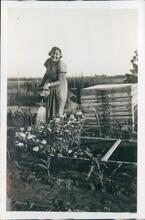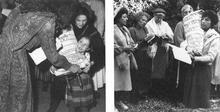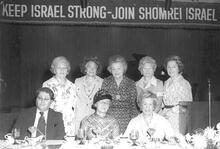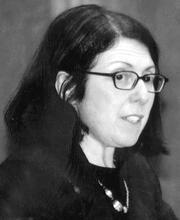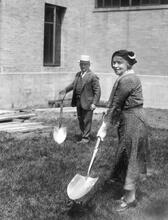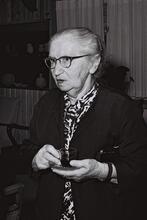Roza Shoshana Joffe
Roza Shoshana Joffe grew up in a small town in Ukraine. Despite their lack of formal education, her parents—in particular her mother—made sure Roza and her siblings received the best education possible. After completing her studies at a gymnasium in Berdiyansk, Joffe studied natural sciences in Montpelier, France. She returned to the Ukraine to teach at a Jewish school, loved the work, and decided to emigrate to Palestine, dreaming of establishing a girls’ school. Soon after she arrived in Tiberias in 1892, the Alliance Israélite Universelle asked Joffe to head its girls’ school in Jaffa, a position she accepted and remained in for over a decade. Joffe left the school in 1904 to become a farmer in the north, where she hoped to establish a school for the farmers’ daughters. She died suddenly in 1914 and never realized her dream.
Early Life and Education
Roza Shoshana Joffe was born in Bristovka in the Yekaterinoslav province, “a distant village in the Ukraine where hatred and contempt for Jews reigned supreme.” Her mother Duva (d. April 13, 1917) did not have the benefit of formal education but was nevertheless a woman of the book, who diligently read her children books from the family’s well-stocked library, taught them to read with the aid of dice games, and educated them in “the liberal ideology of justice, brotherhood, and equality.” Her Lithuanian-born merchant father Yermiyahu was learned in Torah she-bi-khetav: Lit. "the written Torah." The Bible; the Pentateuch; Tanakh (the Pentateuch, Prophets and Hagiographia)Torah but an educated and open-minded female/sing.: Member of the Haskalah movement.maskil in his outlook. The education of Roza, her three sisters (Clara, Vitiya, and Rochelle-Rachel) and their brother Hillel (Dr. Hillel Joffe, 1864–1936) was largely in their mother’s hands, since their father was frequently away on business. The parents ensured that the children had as wide-ranging an education as possible. When she was young, Roza and her siblings were sent to the gymnasium in Berdiyansk, on the Sea of Azov. On completing her studies there, Roza went to the south of France and for three years studied natural sciences at Montpelier University.
Upon graduating in 1889 she returned to Russia and began teaching in a Jewish school in Simferopol, Ukraine. Judging by her letters the school was the best in the city. She greatly enjoyed teaching and her pupils loved her classes and did well in their studies. At this time she decided to immigrate to The Land of IsraelErez Israel and establish a girls’ school there. She asked her brother, who was already in the country, to look for work for her at a school or elsewhere, for she was determined to fulfill her desire to settle there.
Teaching in Palestine
In 1892, at the age of 26, Roza joined her brother in Tiberias, where he had settled and where he worked for two years as the city’s doctor. The fulfillment of her dream was delayed until the beginning of 1893, when the Alliance Israélite Universelle asked the 27-year-old to head its girls’ school in Jaffa, in accordance with the organization’s policy that every institution under its aegis be headed by “one of its own kind.” The appointment was also well received by the members of Hovevei Zion in Odessa, who partially funded the school, since they were confident that any sister of Dr. Hillel Joffe would be true to their plan to establish a Hebrew school. Roza and her family were close in spirit to the Members of Hibbat ZionHovevei Zion circles and committed to the national movement. The appointment was also approved by Ahad Ha’am. Roza settled in Jaffa, together with her mother and her sister Rachel, who had also completed natural science studies at Montpelier University and was appointed as the school’s teacher.
On Rosh Hodesh Adar 1893, the school opened with the declared intention of teaching Hebrew to the girls of Jaffa, the mothers of the next generation, so that they might speak the language with their children and thus raise a new Hebrew generation in Erez Israel. And thus the era of the National Hebrew School was launched in Jaffa. However, the gap between the conflicting goals of the two founding organizations soon became apparent and there was no way of bridging it. Hovevei Zion had their sights set on a nationalist school, where Hebrew would be the sole language of instruction, while the Alliance, with its assimilationist tendencies, inculcated French language and culture in the Jews of the Middle East. The Alliance demanded that teaching be in French, but Roza opposed and ignored this directive. Imposing Hebrew as the major language of instruction was the first case of teaching general studies in that language, and it established the foundations of modern Hebrew education in Erez Israel. The two basic assumptions could not co-exist; misunderstandings and disputes soon led to sorry consequences.
For ten years the school functioned in the shadow of conflicts and disagreements between the partners in Jaffa and Odessa and their counterparts in Paris regarding the Hebrew-nationalist method of the schools. As a result, in the 1902/1903 school year, at the recommendation of Ahad Ha’am, the girls’ school was transferred to the sole ownership of the Hovevei Zion organization of Odessa. The school continued to develop “thanks to the hard work of the teaching staff and the principal, who was wholeheartedly dedicated to this project.”
Dedication to Students Amid School-Wide Conflicts
Her pupils’ welfare and the school’s ongoing development were always Roza Joffe’s prime concern and she devoted herself to them with all her might. The school educated in the spirit of love of the Hebrew language and the values of Hebrew culture. When Ahad Ha’am visited the school, he was profoundly impressed and noted the good atmosphere that reigned in it, the excellent relations between the staff and the pupils, the utter dedication to their tasks of the educators and the diligence of the pupils, thirsting for knowledge. Roza cultivated the outstanding pupils; she trained them to become teachers in the Lit. "village." The dominant pioneer settlement type of the Jews in Palestine between 1882moshavot, thus paving the way for them to lead economically independent lives. At the same time, she was fulfilling Hovevei Zion’s goal of establishing a cadre of educators, which was perceived as the major purpose of the Hebrew girls’ school. Despite the difficulties with which she had to cope, she succeeded in establishing close connections with her pupils, who both respected and admired her.
However, the problems continued and increased. The school faced operating difficulties as a result of many expenses and little income. It was indigent and could scarcely provide a living for its teachers. For a further two years (1903–1904), Roza continued her attempt to set the school on a firm path, coping endlessly with budgetary difficulties, antiquated premises, high rent, and, above all, a shortage of staff, curricula, textbooks, and teaching materials.
In addition to these external difficulties, Roza had to deal with unexpected internal problems. The Hebrew-speaking members of her staff opposed the extension of her appointment and harshly criticized the fact that she spoke both French and Russian. The topic that became the focus of the conflict was that her Hebrew was not perfect. In their opinion, a woman who was deficient in Hebrew and served as a teacher of French did not deserve to head a Hebrew school.
After eleven years as principal, during which she had fought for the school’s very existence, Roza Joffe had enough of the endless complaints and criticisms of the teachers, Hovevei Zion, and the Alliance. At the end of the 1903–1904 school year she was compelled to give up her position. Although the Alliance offered her a teaching position at one of its schools elsewhere, she rejected these offers and insisted on staying in Erez Israel.
Leaving the City to Cultivate the Land
As a Lover of Zion she had since childhood imbibed the desire to make Lit. "ascent." A "calling up" to the Torah during its reading in the synagogue.aliyah and participate in the Zionist project. It was now clear to her that her proper place was in the village rather than the city. She therefore reached a remarkable decision: to settle in one of the moshavot in the Galilee and there establish not only an agricultural holding, but perhaps also a school for the daughters of farmers. Henceforth it seemed to be quite natural that she should connect her life to the Hebrew village and work the land. She chose Yavne’el, the “mother of moshavot in the Lower Galilee.”
At the end of 1904, Roza Joffe left Jaffa and became a farmer at Yavne’el. She established her own farm—an unusual phenomenon in this society of farmers who operated family-based farms. At first she was highly regarded because she had left the city and become an independent smallhold owner. She differed from the other women in the moshavah in being single, highly educated, independent, “strong,” and running a farm which she operated herself. Building herself a large house in the center of the moshavah, she cultivated grain crops (wheat, barley, and cattle fodder such as dura, and also ran a subsidiary farm devoted primarily to raising animals (cattle, poultry, sheep and horses) and also to growing vegetables. Her close relations with the officials of Baron Maurice de Hirsch helped her in operating the farm, but heightened the anger and envy of the other farmers and led to conflicts with them. Over time, there arose opposition to her. She constantly voiced criticism of the farmers, interfered in their activities, accused them of being lazy, easily discouraged, lacking in energy, and the will to work.
Roza participated regularly in the general meetings of the moshavah and frequently expressed her opinions and presented proposals, but her suggestions were usually rejected. As an independent farmer she had voting rights equal to those of the male farmers. At the general meeting in November 1913 she was even nominated as chair of the committee, but she withdrew her candidacy.
Joffe remained in Yavne’el until December 1913, when she suddenly contracted anthrax poisoning, a virus that humans incur from animals, and died a month later. Her brother, Dr. Hillel Joffe, was summoned urgently, but he arrived too late to save her. She never married or raised a family and her dream of establishing a school for the daughters of farmers was cut short by her tragic death.
Hebrew
Ahad Ha’am. “Schools in Jaffa.” The Complete Works of Ahad Ha’am (Hebrew). Tel Aviv and Jerusalem: 1965, 37–39.
The Aviezer Yellin Archives of Jewish Education in Israel and the Diaspora. Tel Aviv University.
Azaryahu, Joseph. “The History of the Girls’ School.” Yafo: mikrash historit-sifrutit: perakim be0divre yeme ha-‘ir mi-reshitah be-‘ad yamenu (Jaffa: Historical-Literary Reader: Chapters in the City’s History from Its Beginnings Until Today), edited by Yosef Arikha. Tel Aviv-Jaffa: Iriyat Tel Aviv-Yafo, ha-Mahlakah le-hinukh, 1957.
Belkind, I. “Shoshana Joffe, of blessed memory” (Hebrew). Ha-Herut, January 27, 1914.
The Central Zionist Archives, Jerusalem. Hillel Joffe Archive A24.
Elboim-Dror, Rachel. Ha-Hinukh ha-Ivri be-Erets-Yisrael (Education in Erez Israel), vol. 1. Jerusalem: Yad Yitshak Ben-Zvi, 1986.
Ever Hadani (Aharon Feldman). Fifty Years of Settlement in the Galilee (Hebrew). Ramat Gan: Massadah, 1955, 263–265, 339.
Grazovsky, I. “Miss Joffe of blessed memory” (Hebrew). Ha-Zefirah, February 10, 1914.
Gur, Yehuda. “Schools in Jaffa I” (Hebrew) Ha-Dor 14 (March 28, 1901): 12–13.
Joffe, Hillel. “On the Schools in Jaffa” (Hebrew). Ha-Shiloah, vol. 2, Pamphlet 7–12. April-September 1897, 473–474.
Joffe, Hillel. “On the Schools in Jaffa: Dor Ma’apilim” (Hebrew). Jerusalem: 1971.
Joffe, Roza. “On the School in Jaffa” (Hebrew). Ha-shiloah, vol. 5, Pamphlet 25–30. 1899, 69–72.
Lavon Institute Labor and He-Halutz Archive. Minutes of the Yavne’el Moshavah, 1911–1914, Section IV 312-8-1, files 1, 3.
“The regulations and curriculum of the municipal girls’ school in Jaffa.” Jaffa: 1910.
Rozman, Yael. “Joffe, Roza.” Nashim be-Yisrael: leksikon (Women in Israel: A Lexicon). Tel Aviv: Am ‘oved be-shituf ‘im Yarhon Na’amat, 1992, 77.
“Schools in Jaffa II” (Hebrew). Ha-Dor 15 (April 4, 1901): 11–12.
“Shoshana Joffe of blessed memory.” Ha-Olam, issue 5 (361) (1914).
“Yizkor.” In Sefer ha-yovel shel histadrut ha-morim be-erez Israel 1903–1928 (Anniversary Volume of the Teachers’ Federation, 1903-1928), edited by Dov Kimche, 428. Jerusalem: 1929.


